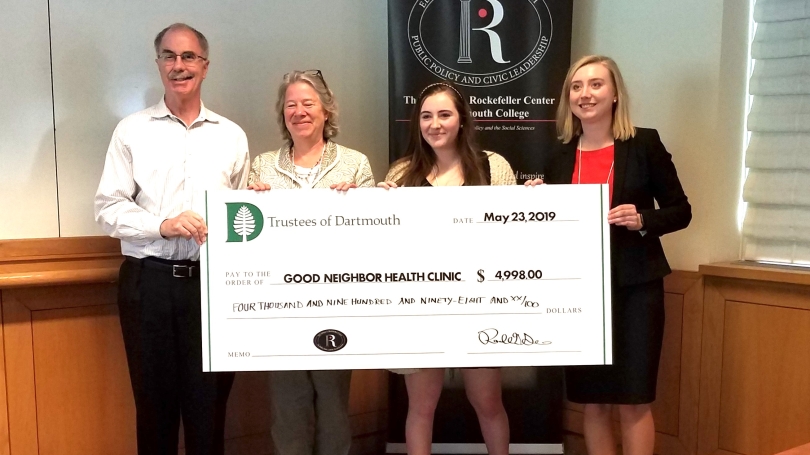
- Public Policy
- Leadership
- Funding
- News & Events
- About the Center
Back to Top Nav
Back to Top Nav
Back to Top Nav
Back to Top Nav
At the Rockefeller Center, academic courses are paired with experiential opportunities so students can put their abstract learning into practice. This integrated model gives students the intellectual framework and the hands-on experience they need to become effective leaders in the world beyond Dartmouth.
Most students start with Public Policy 5: Introduction to Public Policy, where they learn the fundamentals of policymaking. The course serves as a prerequisite to the First-Year Fellows program, which places rising sophomores into summer policy internships with Dartmouth alumni mentors in Washington, D.C. Commenting on the impact of First-Year Fellows, Olivia Brody-Bizar ’21 says, “Experiencing this fellowship early in my college career has changed the trajectory of my future endeavors. Each day presented immense opportunity for growth, both professionally and personally.”
The Class of 1964 Policy Research Shop (PRS) is an experiential learning opportunity that begins in Public Policy 45: Introduction to Public Policy Research. Since its inception, the PRS has engaged 400 students in 65,000 hours of research and analysis to produce 200 non-partisan, pro-bono reports for the New Hampshire and Vermont state legislatures as well as statewide commissions, county and regional governments, and localities. “We challenge students beyond the traditional boundaries of what constitutes a meaningful educational experience. Students work on real issues for real clients who need high-quality, unbiased social science research,” says Professor Ronald Shaiko, Senior Fellow and Associate Director of Curricular and Research Programs at the Rockefeller Center.
At the conclusion of their research, students testify before state legislators, and many students cite this experience as a highlight of their undergraduate education. “PRS taught me so much about how to present complicated material in an easy to understand and actionable fashion,” says Joby Bernstein ’17. “My experiences in the Policy Research Shop and also earlier as a First-Year Fellow taught me that to be a leader, I would have to be the one always willing to work the hardest. These lessons and others I learned through Rocky were very valuable and helped me in many other aspects.”
Public Policy 85: Global Policy Leadership shifts the out-of-classroom experience from the domestic to the international, but with the same goal of making the theoretical learning more personal, nuanced, and tangible. In the classroom, students contextualize a public policy challenge in a country or region. They then travel to the country or region during winter interim to conduct field research. This past fall, students examined the genesis and implementation of the peace accords signed in 2016 between the Colombian government and the Revolutionary Armed Forces of Colombia (FARC). Students meet with politicians, academics, civil society leaders, journalists, business leaders, diplomats, and other in-country experts to inform their analyses.
“The importance of travel is twofold,” explains Professor Charles Wheelan ’88. “First is this marriage of learning in the classroom and talking to people on the ground. Second is testing your hypotheses and listening to people who have very conflicting points of view.” The culminating project—delivering a detailed memo with specific policy recommendations—teaches students transferable workplace skills such as project management, teamwork, and problem solving.
This academic year also featured a redesigned course, PBPL 51: Leadership in Civil Society - Philanthropy in the Nonprofit Sector. Students awarded $40,000 in grants to eight Upper Valley nonprofit organizations after soliciting proposals and evaluating funding applications from 30 area organizations. Professor Shaiko refreshed the class with support from the Center for Social Impact and a grant from the Once Upon a Time Foundation’s Philanthropy Lab.
President Philip J. Hanlon ’77 attended the grant presentation in May and hailed the class as an outstanding example of experiential learning. He congratulated the students for undertaking the challenging real-world task of figuring out how to distribute limited resources for maximum good. “I hope you learned a lot about the complexities of the world in this course—about the difficulty of making decisions when it’s a good thing versus another good thing,” Hanlon said. Eitan Darwish ’21, a student in the class, said evaluating funding requests was eye opening. “How many 20-year-olds get a chance to evaluate grants? We were essentially a foundation, and we got to be the board of the foundation, and that’s pretty remarkable,” Darwish said.
“Grand ideas of government—lofty abstract principles, even the wisest of constitutions and laws—depend for their very life and meaning on the willingness of citizens and leaders to apply them and to improve them,” wrote Nelson A. Rockefeller in The Future of Federalism. Thirty-five years after its dedication, the Rockefeller Center is fully committed to the development of such citizens and leaders.